Author(s) |
Title and Abstract |
Tang, H. H. H., & Zhang, Y.

|
Enterprising self through higher education: Youth, aspirations and future amidst academic entrepreneurialism. Youth, 2(4), 646-653 Doi:10.3390/youth2040045.
Abstract:
This paper examines the macro trends, policy responses, and their impact on youth and their aspirations about the future. It uses the conceptualisation of “the self as enterprise” to focus our discussions about how, and to what extent, youth try to “enterprise” their selves through higher education amidst the global rise of academic entrepreneurialism. The paper addresses the new reality of changing economies and creative disruptions of employment markets facing youth and their futures. We will talk about the way youth career aspirations will be reconsidered and the role of higher education in it. We also discuss the in-betweenness of materialistic and post-materialistic pursuits among young people, as well as the topic about “enterprising self” through higher education and innovating futures using youth’s entrepreneurial mindset, competence, and “self-entrepreneurship”. The paper will end by discussing some inspirations and insights for policies and practices and empirical research concerning the topic of youth, futures, and aspirations.
Keywords: Higher Education; Youth Aspirations; Future; Academic Entrepreneurialism.
|
Tang, H. H. H., & Zhang, Y.

|
Stories to live by: Narrative understandings of the self-concept of students at self-financing higher education institutions in Hong Kong. Sustainability, 14(20) Doi:10.3390/su142013059.
Abstract:
Self-financing higher education institutions (SfHEIs) in Hong Kong help boost the local higher education participation rate, but they are labeled as second-tier opportunities for those with academic weaknesses. Students at SfHEIs may develop a negative self-concept that deteriorates their academic performance and psychological wellness. Therefore, it is critical to understand their self-concept and how it is built. From the narrative perspective, a self-concept is the storied experiences or stories that are lived; therefore, this study employs narrative inquiry using 15 SfHEI students to represent the general pattern of the participants’ experiences. This study proves that students at SfHEIs tend to view themselves as losers or inferiors based on their low self-evaluations of their Hong Kong Diploma of Secondary Education Examination (HKDSE) results, SfHEIs, and career futures. Additionally, this study sheds new light that the loser identity is historically developed from childhood during interactions with parents and teachers, as parents and teachers continuously reinforce the message that enrollment at a publicly funded university is the only way to achieve success in life.
Keywords: Self-concept; Narratives; Higher Education.
|
Buyukgoze, H., Caliskan, O.,
& Gümüş, S.
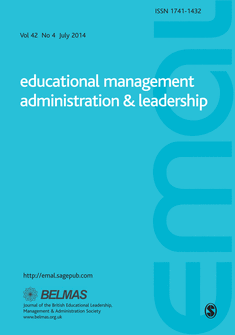
|
Linking distributed leadership with collective teacher innovativeness: The mediating roles of job satisfaction and professional collaboration. Educational Management Administration & Leadership, 17411432221130879.
Abstract:
Collective teacher innovativeness has emerged as a recent topic of interest in both international policy documents and scholarly research. However, only a few studies have focused on the factors that enable collective teacher innovativeness, particularly in terms of revealing whether and to what extent school leadership might influence this construct. Existing literature suggests that distributed leadership can influence teachers’ instructional practices, emotions, and daily activities, all of which could be important to teacher innovativeness. The present study, therefore, aimed to explore the effect of distributed leadership in fostering collective teacher innovativeness, as well as the mediating roles played by job satisfaction and professional collaboration, by using the Teaching and Learning International Survey 2018 dataset. The findings of the partial mediation structural equation model analysis revealed that distributed leadership has both direct and indirect effects on collective teacher innovativeness, as mediated by job satisfaction and professional collaboration. The results provide evidence of how principal leadership practices impact teachers’ changes in behaviors through professional attitudes and practices.
|
Kouhsari, M.,
& Chen, J.
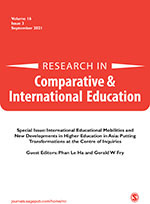
|
Multi-level analysis of teacher professional well-being and its influential factors based on TALIS data. Research in Comparative and International Education. doi: 10.1177/17454999221143847
Abstract:
The current study examines how teachers’ professional wellbeing is affected by teacher-level and school-level factors using the TALIS 2018 data. Teacher-level factors consist of teachers’ instructional practices and teachers’ professional practices and school-level factors include school climate, school leadership styles and workload. The Hierarchical Linear Modeling (HLM) was used to examine whether the principals’ leadership, school climate and workload and teachers’ instructional practices and teachers’ professional practices explain the variation in teacher self-efficacy, teacher job satisfaction, and motivation and perceptions net of several important teacher-level and school-level control variables. The results revealed that both the teacher- and school-level factors were significantly related to teachers’ professional wellbeing. These findings were discussed concerning five countries of Canada, China, Finland, Japan and Singapore. The implications of the findings for improving teachers’ professional wellbeing are discussed.
|
Yu, D.,
Chen, J.,
Li, X.,
& Yan, Z.
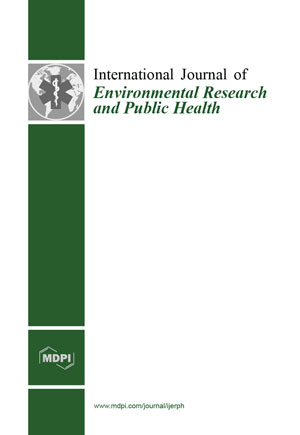
|
Trajectory of teacher well-being research between 1973 and 2021: Review evidence from 49 years in Asia. International Journal of Environmental Research and Public Health. 19, 12342. https://doi.org/ 10.3390/ijerph191912342
Abstract:
This review portrays a dynamic developmental trend in the teacher well-being literature in Asia between 1973 and 2021 using a descriptive quantitative analysis approach. A search of the Scopus database identified 168 journal articles across 46 countries and regions in Asia. This number of publications indicated a substantial change in the knowledge corpus, particularly during the pandemic, although overall production was still relatively low. Further results revealed diversity but an imbalance of research location, research type, research methods, data collection techniques, and research foci. A functionalist perspective may suggest that the knowledge base on teacher well-being is at a beginning stage. Recommendations for future research are proposed including cross-region collaborations, more developed research foci, using mixed-method approaches, high-quality qualitative research designs, innovative qualitative techniques, and diverse qualitative data collection techniques.hina.
Keywords: Teacher well-being; Review; Descriptive quantitative approach; Developmental trend; Asia
|
Shan, Y. M.,
& Chen, J.
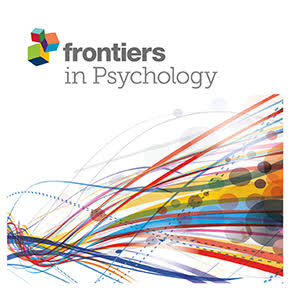
|
Teaching research group leaders’ perceptions of their engagement in curriculum leadership. Frontiers in Psychology (Organizational Psychology). https://doi.org/10.3389/fpsyg.2022.944445
Abstract:
Understanding how teacher leaders are engaged in curriculum affairs is critical with the implementation of instructional decentralization. The current study adopts a qualitative approach to investigate Teaching Research Group (TRG) leaders’ involvement in curriculum leadership (CL) in the Chinese context. It explores the conceptions of TRG leaders by interviewing 20 of them, observing four meetings held by TRG leaders, and collecting 10 extracts from appraisal summaries of TRG leaders in secondary schools in China. Drawing on the findings, this paper examines the characteristics of TRG leader’s engagement in CL. More importantly, data highlighted significant problems the participants perceived and faced in their work as TRG leaders, which consisted of amplifying the necessity for empowering TRG leaders and identifying the phenomenon that said leaders are less empowered and less motivated to undertake the CL role. The results add to the international body of knowledge on the teachers’ engagement in CL.
|
Wang, X.,
Yan Z.,
Huang, Y.C.,
Tang, A. Q.,
& Chen, J.

|
Re-developing the Adversity Quotient Scale for Chinese University Students. International Journal of Environmental Research and Public Health, 19(11): 6389. https://doi.org/10.3390/ijerph19116389.
Abstract:
Adversity response is fundamental to dealing with adversity. This paper reports the re-development and subsequent psychometric evaluation of the Adversity Response Profile for Chinese University Students (ARP-CUS). The data were collected from a Chinese university student sample (n = 474). Factor analysis and Rasch analysis were used to examine the psychometric properties of the ARP-CUS. Exploratory factor analysis revealed a six-factor model; then confirmatory factor analysis supported a five-factor solution. Rasch analysis provided further evidence of the psychometric quality of the instrument in terms of dimensionality, rating scale effectiveness, and item fit statistics for those six dimensions. The final version of the ARP-CUS contains 24 items across five subscales for assessing students’ responses to adversity, including control, attribution, reach, endurance, and transcendence. Overall, ARP-CUS demonstrates satisfactory psychometric properties for quantifying the adversity quotient of Chinese university students.ina.
Keywords: Aadversity Response Profile; Adversity Quotient; Scale Re-development; Rasch measurement
|
Ho, C. S. M.,
& Lee, D. H. L.
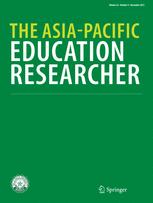
|
Financial literacy: The impact of the foreign language effect on risk-taking values, financial attitudes and behavior of Hong Kong secondary students. The Asia-Pacific Education Researcher, https://doi.org/10.1007/s40299-022-00670-5 .
Abstract:
Students in Asia usually receive financial literacy education in English. This study examines the foreign-language effects of financial literacy education both at home and school among secondary school students in Hong Kong (n = 1011). The study investigates the influence of language on students’ risk-taking values, financial attitudes (conscientious and entitlement), and their subsequent financial behavior (saving, planning, and protection). Structural equation modeling results indicate significant positive connections between learning in English in school and the home language, student risk-taking values, and their conscientiousness and financial behavior. However, we also found that language effects were far more complex than only foreign-language effects, and entitlement has much less significance in an Asian context like Hong Kong. Although financial literacy is more accessible if students are taught in their native language, using English as the medium of instruction develops students’ financial literacy in many other aspects, including their information access to valuable financial resources circulated worldwide. This paper explains why students who are proficient in English tend to be risk-takers but are nonetheless also conscientious in protecting themselves against financial losses. We propose that additional support in studying financial literacy in English is necessary to improve students’ financial literacy in contexts where English is not the native tongue.Query
|
Ma, Y.,
& Wright, E.
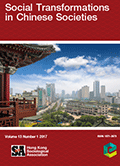
|
Expanding flexible citizenship: Chinese international school students and global mobilities for higher education. Social Transformations in Chinese Societies. ahead-of-print. https://doi.org/10.1108/STICS-05-2022-0010
Abstract:
Purpose This study aims to interrogate and expand on the flexible citizenship framework by illuminating students' emergent identities and imagined future mobilities in China's expanding international school sector.
Design/methodology/approach In-depth semistructured interviews were conducted with international school students and their parents in Shenzhen, covering their motivations for overseas higher education, experience with international schooling, self-perceived identities and imagined futures.
Findings The participants aspired to overseas higher education for both symbolic capital attainment and embodied cultural cultivation to thrive in a globalised world. They expressed confidence that international schooling experiences prepared students for mobility to Western higher education and cultivated globally-oriented identities while not undermining their Chinese roots. They imagined their futures in terms of considerable flexibility, with a rising China viewed as an attractive and feasible option for career development.
Research limitations/implications This research provides an enriched understanding of a new generation of globally mobile Chinese students. The participants held distinctively different outlooks, aspirations and attitudes than depicted in the flexible citizenship framework, which emphasised a one-dimensional and instrumentalist portrayal of Chinese international students. This study discusses cross-generational changes in the desire for overseas education and a global-national outlook among young people in the context of significant social transformations in urban China.
Originality/value The originality of this study is in expanding the flexible citizenship framework with reference to the emergent identities and pathways of students in the international schooling sector in China.
Keywords: Flexiible Citizenship; Global Citizenship; International Schools; Identity; China
|
Wang, P.,
& Ko, J.
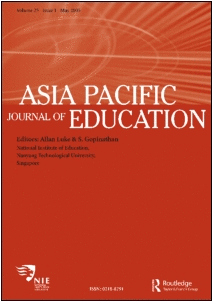
|
ICT competency and practicum of preservice teachers as digital natives: A mixed-method study. Asia Pacific Journal of Education. https://doi.org/10.1080/02188791.2022.2083581
Abstract:
Along with the global trend of developing students’ 21st-century skills, teacher education must enable preservice teachers (PSTs) to improve students’ learning outcomes with Information and Communications Technology (ICT), and school practicum plays an essential role in the process. This study investigated Hong Kong PSTs’ ICT competency with or without teaching practicum completed and explored factors contributing to ICT competency in and beyond the practicum. This mixed-methods study began with a questionnaire to give a broad picture of the ICT competence of Hong Kong PSTs of English (N = 127), who were found to perceive themselves as competent with educational technology and their competencies of understanding ICT related policy and using ICT for professional development was enhanced after school practicum. A purposeful subset of the sample (N = 10) was interviewed based on their ICT competency scores, exploring the factors shaping interviewees’ readiness and ICT use in their teaching practicum. It highlights that digital native students do not naturally transform into teachers with ICT competency to facilitate 21st-century learning, and the practicum could play a more critical role in enhancing their ICT competence to future-proof their skills. Promoting ICT-friendly school culture and designing better teaching practicum programmes are suggested.
Keywords: 21st-century Learning; ICT Competency; Mixed-methods; Preservice Teachers; Teacher Education; Teaching Practicum
|
Santos, J. M.,
Liu, Y., &
Tang, H. H. H.
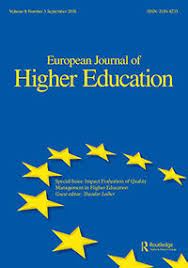
|
Research agendas and culture: a new approach to analysing the academic profession in Asia and Europe. European Journal of Higher Education, 1-22.
Abstract:
This paper investigates the research agendas of academics in Asia and Europe with reference to cultural influences rooted in the two continents. Unlike studies on the influence of culture on research that focus on only one or a few countries, this study explores the relationship between cultural dimensions and research agendas at the continental level, across Europe and Asia. The study uses general linear modelling with interaction terms to identify how cultural dimensions influence research agendas and how their influence differs between Europe and Asia. Hofstede’s cultural dimensions model and the Multidimensional Research Agendas Inventory-Revised scale are adopted in this study, as measures of cultural dimensions and research agenda-setting, respectively. The results show that culture influences several aspects of research agenda-setting in both Asia and Europe, but these dynamics are not always identical across continents. These findings are relevant both for academics studying the cultural dynamics of science, and also for policymakers who need to consider these cultural dimensions while striving to promote specific research agendas.
Keywords: Research Agenda-setting, Cultural Dimensions, Academics in Europe and Asia, Hofstede’s Cultural Model
|
Özdemir, N., Gümüş, S.,
Kılınç, A. Ç.,
& Bellibaş, M. Ş.

|
A systematic review of research on the relationship between school leadership and student achievement: An updated framework and future direction. Educational Management Administration & Leadership. DOI: 17411432221118662.
Abstract:
This systematic review sought to expand our knowledge of the increasing research studies focusing on the empirical link between school leadership and student achievement. Using five different data sources (Scopus, WoS, ERIC, Google Scholar, and Retrospective Reference Harvesting Procedure), we created a data set of 144 journal articles. Descriptive analysis of bibliographic data and content analysis of full texts were employed in the review process. The results revealed instructional leadership as the most frequently used school leadership model in the relevant research. There has been a growing tendency to use the direct effect model with the increase in the studies from non-English speaking western societies. Indeed, the use of rational and organizational variables has dominated the mediating effect studies, while moderating effect studies as well as exploratory and explanatory type of studies have not received much attention. Based on these results, a framework representing the broader picture of the current research on the relationship between school leadership and student learning is provided. In addition, several recommendations were made, aiming to build the research capacity in furthering our understanding of how school leadership practices impact student learning and achievement.
|
Gümüş, S., Çağatay Kılınç, A.,
& Bellibaş, M. S.
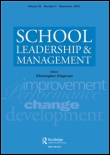
|
The relationship between teacher leadership capacity at school and teacher self-efficacy: the mediating role of teacher professional learning. School Leadership & Management, Online First.
Abstract:
This study sought to explore the relationship between teacher leadership and teacher self-efficacy with the mediating role of teacher professional learning. The study employed a cross-sectional quantitative design with data compiled among public elementary, middle, and high schools across different regions of Turkey. We employed structural equation model (SEM) to estimate the structural relationships between teacher leadership capacity at school, teacher professional learning, and teacher self-efficacy. The results revealed a positive and statistically significant relationship between all three variables. While the effect sizes for the relationship between teacher professional learning and teacher self-efficacy, and between teacher leadership and teacher self-efficacy were small, there was a large effect size for the relationship between teacher leadership and teacher professional learning.
Keywords: Teacher Leadership, Professional Learning, Teacher Self-efficacy, School leadership
|
Chen, J.,
& Lee, J.C-K.
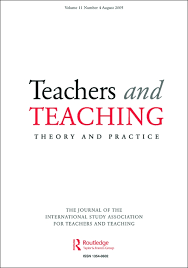
|
Teacher resilience matters: A buffering and boosting effect on their well-being and job performance. Teachers and Teaching: Theory and Practice.
DOI: 10.1080/13540602.2022.2116574.
Abstract:
This study investigated the mediation role of teacher resilience between job demands and resources and their well-being and job performance using a sample of 407 teachers from Hong Kong, SAR and mainland China. Confirmatory factor analysis and structural equation modelling were employed to deal with the dataset. The results indicated that the professional dimension and the emotional dimension of teacher resilience were affected by decision latitude (potential control over the job tasks and conducts) and school support respectively and predicted teacher well-being. The motivational dimension and the social dimension of teacher resilience promoted teacher job performance, influenced respectively by task overload (negatively) and role demand (positively) along with school support. This model is the first attempt to represent the relevance of the Job Demands-Resources theory that teacher resilience can buffer negative job demands and boost positive job resources to promote their well-being and performance in a specific societal and educational context. Implications for cultivating teacher resilience to everyday challenges and adversities were proposed in order to assist teachers to not only survive, recover, and thrive, but also to establish a school resilience cascade (potential resilience chain affecting a system due to an act of teacher resilience) for these turbulent times.
Keywords:
Job Demands and Resources, Teacher Resilience, Teacher Well-being, Job Performance
|
Kouhsari, M.,
& Chen, J.
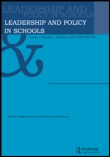
|
The effect of principal emotional intelligence on teacher performance: Mediating roles of organizational trust and professional learning community. Leadership and Policy in Schools. https://doi.org/10.1080/15700763.2022.2088392.
Abstract:
Teacher’s performance has significant influence on student’s achievement. Few studies have sought to investigate the role of principal emotional intelligence on teacher job performance. This study examined the effects of principals’ emotional intelligence on teacher performance by mediating the roles of organizational trust and professional learning communities. Results from a sample of 400 teachers and 100 principals in Iranian primary schools showed that all path coefficients from principals’ emotional intelligence to organizational trust, professional learning community, and teacher performance were non-significant. Additionally, there were positive and significant relationships among organizational trust, professional learning community, and teacher performance.
|
Wright, E.,
&
Mulvey, B.
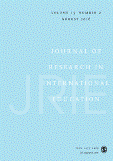
|
The promised capitals of international high school programmes and the global field of higher education: The case of Shenzhen, China. Journal of Research in International Education. DOI: 10.1177/14752409221122070.
Abstract:
The term ‘international school’ encompasses a broad array of institutions offering a range of different programmes. However, the differences between these programmes have scarcely been explored in the existing literature. This article focuses on three popular international high school programmes (Advanced Levels, Advanced Placement, and International Baccalaureate Diploma Programme) by drawing upon in-depth interviews with international school counsellors, teachers, parents, and students in Shenzhen, China. We employed the Bourdieusian concepts of ‘promised capitals’ and the ‘global field of higher education’ to delineate differences amongst these international programmes. We argue that each international programme promises the accumulation of distinct combinations of capitals associated with different global circuits of mobility for higher education. At the same time, we also suggest that the extent to which the promised capitals are conferred is complicated by the ‘localisation’ of schools: this impacted the delivery of promises related to embodied cultural and social capital forms.
|
Wright, E.,
Lin, C.,
& Lu, J.
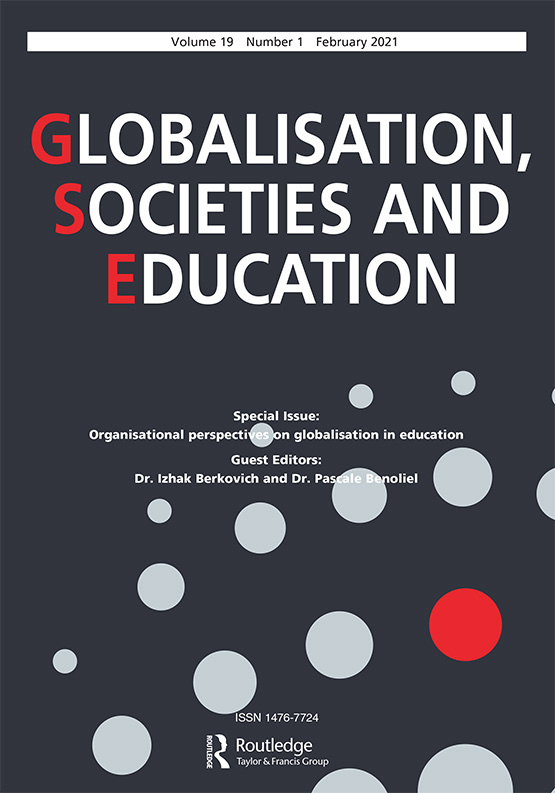
|
The turning tide of the International Baccalaureate in China: When global dreams meet national priorities. Globalisation, Societies and Education. DOI: 10.1080/14767724.2022.2115342.
Abstract:
This article investigates how the International Baccalaureate’s ‘global dream’ for education interacts with the national priorities of governments. In mainland China, a thriving international school market has been met with tightened government control. We draw on the analytical lens of ‘cosmopolitan nationalism’ to demonstrate how a cosmopolitan openness to international schooling was subject to reversal when deemed to counter national interests. Through content analysis of government documents and state media, we discuss how representations of the International Baccalaureate were in tension with national agendas of the ‘China dream’ and ‘common prosperity’. Finally, we reflect on the malleability of the International Baccalaureate across diverse national contexts.
Keywords: International Baccalaureate, International Education, Cosmopolitan Nationalism, China Dream, Common Prosperity
|
Choi, T. H.
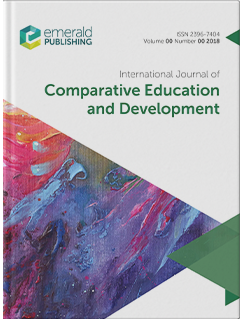
|
Path-dependency and path-shaping in translation of borrowed policy: outsourcing of teaching in public schools in Hong Kong and South Korea. International Journal of Comparative Education and Development. Advanced Online Publication. https://doi.org/10.1108/IJCED-01-2022-0004.
Abstract:
PurposeThe study systematically analyses the path dependency and path-shaping of borrowed education policy, tracing it from the global through the national to individual schools. It also revisits the case schools after five years to map the school level policy paths.Design/methodology/approachRecently, path-dependency heuristics have drawn attention in predicting educational policy trajectories. However, these studies are primarily theoretical, and those empirical studies do not capture what happens at the school level. This paper fills the research gap by presenting a model that synthesises the research from diverse fields and is informed by findings from a longitudinal case study of educational outsourcing in public schools in Hong Kong and Korea.FindingsThe findings highlight path dependency interactions across educational levels diachronically and synchronically, while aptly incorporating the creative ways school leaders exercise their agency therein. The paper concludes with new insights into policy trajectory and education outsourcing.Originality/valueThe study substantiates and extends previously suggested theoretical models on the paths of travelling educational policies and identifies the factors that shape the paths. It also sheds light on how school leaders navigate the structures that constrain their actions or create a new path and pursue their educational goals.
Keywords: Path Dependency, Teaching In Public Schools, Education Policy, Public Schools, Policy Trajectories, School Leaders, Educational Goals, School Level, Schools In Korea, South Korea
|
Tang, J.
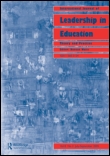
|
Mapping the terrain: a literature review on school middle leadership in Mainland China. International Journal of Leadership in Education. https://doi.org/10.1080/13603124.2022.2120633.
Abstract:
This article comprises a review of the literature on school middle leadership published in mainland China from 1995–2021. It pioneers building a knowledge base and provides ‘a topographical map of the terrain’ for China to fill a gap in the school middle leadership literature. The studies are reviewed in terms of their focus, conceptual and methodological development, and findings. Of the studies included in the review, the non-empirical ones are mostly description and commentary. The descriptive studies highlight the roles and practices of middle leaders, provide summaries of successful middle leadership practices, and present conclusions about core strategies for middle leadership development. The commentaries are discussions of the requisite competencies for successful school middle leaders, the challenges they face, and strategies for enhancing their leadership. The studies reviewed reflect the limited output of empirical research and a paucity of theoretical orientation regarding school middle leadership in China. The three key themes that emerge from the empirical studies are as follows: middle leaders’ roles and practices, factors influencing middle leadership, and middle leaders’ development. This analysis emphasizes academics’ calls for more sophisticated empirical studies and theoretical analysis to develop middle leadership models in schools in non-Western contexts.
|
Zhang, M.
Walker, A.,
&
Qian, H-Y.
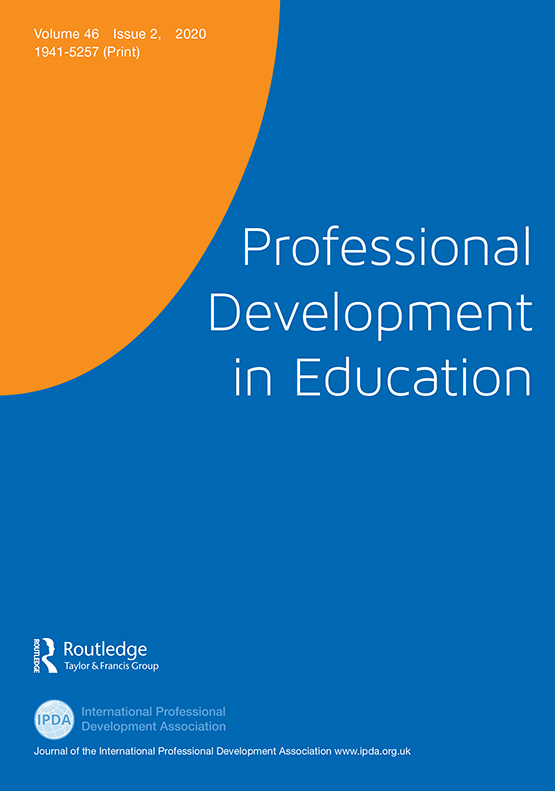
|
Teacher leadership for professional learning: A case study of a master teacher studio in Zhejiang province, China. Professional Development in Education.
DOI: 10.1080/19415257.2022.2111321.
Abstract:
This Promoting teacher professional learning by empowering established master teachers as leaders is a priority in many societies, including America, Australia, and Canada. Yet, few systems have implemented strategies that allow this to happen at scale. China is one of the few societies that engage master teachers in spreading learning. They do this through several initiatives, one of which is through Master Teacher Studios (MTSs). This article investigates how teacher leadership is enacted in an MTS and how the studio leader nurtures teacher learning across schools. Teacher leadership is widely touted as powerful means for improving teacher professional learning within and beyond schools. However, relatively few empirical studies have examined how teacher leaders promote teacher professional learning, especially in China. This paper uses one provinciallevel MTS in Zhejiang province, an economically and educationally advanced region in China, to explore the leadership practices of the MTS host, a master teacher in promoting the MTS members’ professional learning. The paper identifies three major leadership strategies adopted by the host of MTS: acting as a conduit between local government and studio members, yanchuan shenjiao (‘mentoring in words and demonstrating in deeds’), and providing studio members with intellectual, social, and emotional support.
Keywords: Teacher Leadership; Professional Learning; Leadership for Professional Learning; Teacher Leadership in China
|
Tang, J,
Bryant, D. A.,
& Walker, A.
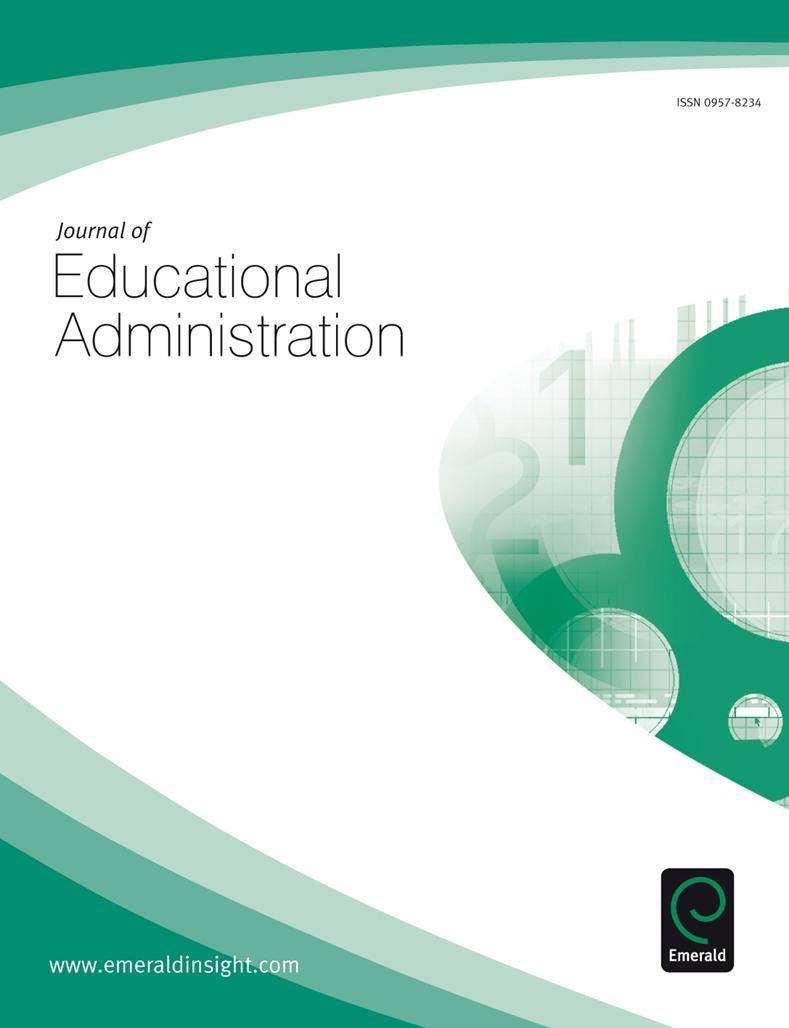
|
School middle leaders as instructional leaders: Building the knowledge base of instruction-oriented middle leadership. Journal of Educational Administration. 60(5) 511-526.
Abstract:
Purpose – This paper explores developments over the past 25 years in the knowledge base on instruction-oriented middle leadership in schools. We document the trends in the literature since middle leadership began to attract scholarly interest in the late 1990s and explore the shifting structural and content patterns in the knowledge base.
Design/methodology/approach – We use a topographic methodology to analyse both structural elements and major results drawing from 147 peer-reviewed journal articles.
Findings – We draw on the review's outcomes to propose a model that frames a core set of middle leaders' instructional leadership practices. We also identify the personal, departmental, organizational and external influences shaping middle leadership practices and identify a lack of research conducted outside Anglo-American societies. This gap in the literature suggests the need for the increased study of middle leadership in different national settings and systems and how these influence the practice and enactment of middle leaders around instruction. There is also a need to employ a greater range of methodologies to understand middle leaders' instructional roles.
Research limitations/implications – The paper lays a foundation for the future development of middle leadership for instruction and highlights signposts to guide future inquiry.
Originality/value – The paper contributes to the middle leader knowledge base by focusing on their enactment of instructional leadership.
Keywords: Middle Leaders, Instructional Leaders, Model, Review
|
Ho, C. S. M.,
Bryant, D. B.,
& Walker, A.

|
Capturing interactions between middle leaders and teacher entrepreneurial behaviour: An examination through a person-environment fit model. School Leadership & Management. https://doi.org/10.1080/13632434.2022.2123792.
Abstract:
Limited but increasing research has noted that middle leaders (MLs) play a crucial role in structuring a supportive working environment to help entrepreneurial teachers transform educational innovation into practice. This study aims to increase understanding of the extent to which MLs with different levels of experience influence teacher entrepreneurial behaviour (TEB). The study employs the three dimensions of the ‘person-environment fit model,’ namely, person-organisation fit, person-group fit, and personjob fit, as a theoretical lens to examine the relationships among MLs, working environment, and TEB. Findings revealed that the more years of experience MLs have in post, the more influence they have in promoting TEB; however, they have limited influence over shaping the working environment, especially the person-organisation environment. Furthermore, the mediating effect of the person-environment fit model was complex because teacher entrepreneurial behaviour was perceived to be a result of the synergy between the person-group and person-job environment. The findings advance knowledge about middle-leadership and teacher-entrepreneurial behaviour across the three dimensions of the person-environment fit model. They also highlight the importance of MLs' leading experience for TEB and further enrich the understanding of how MLs struggle to support TEB in a hierarchical working environment.
Keywords: Middle Leadership, Teacher Entrepreneurial Behaviour, Person-environment Fit Model, Professional Development, School Innovation
|
Ho, C. S. M.,
Bryant, D. B.,
& Lu, J.

|
Nurturing Teachers’ Entrepreneurial Behavior in Schools: Roles and Responsibilities for School Principals. Leadership and Policy in Schools. https://doi.org/10.1080/15700763.2022.2081218.
Abstract:
The promotion of teacher entrepreneurial behavior (TEB) is important for advancing educational change and innovation in schools. However, the principals’ role in facilitating TEB has not been conceptualized in the context of educational leadership theory. This study investigates teachers’ perceptions of principal leadership in cultivating TEB. Using a case study approach, we show how entrepreneurial teachers actualized innovative school-based curriculums in three successful schools. Several principal leadership practices were found to support the teachers when performing TEB. These results further underscore the use of connective pathways by principals for empowering entrepreneurial teachers.
|
Chan, H. L.
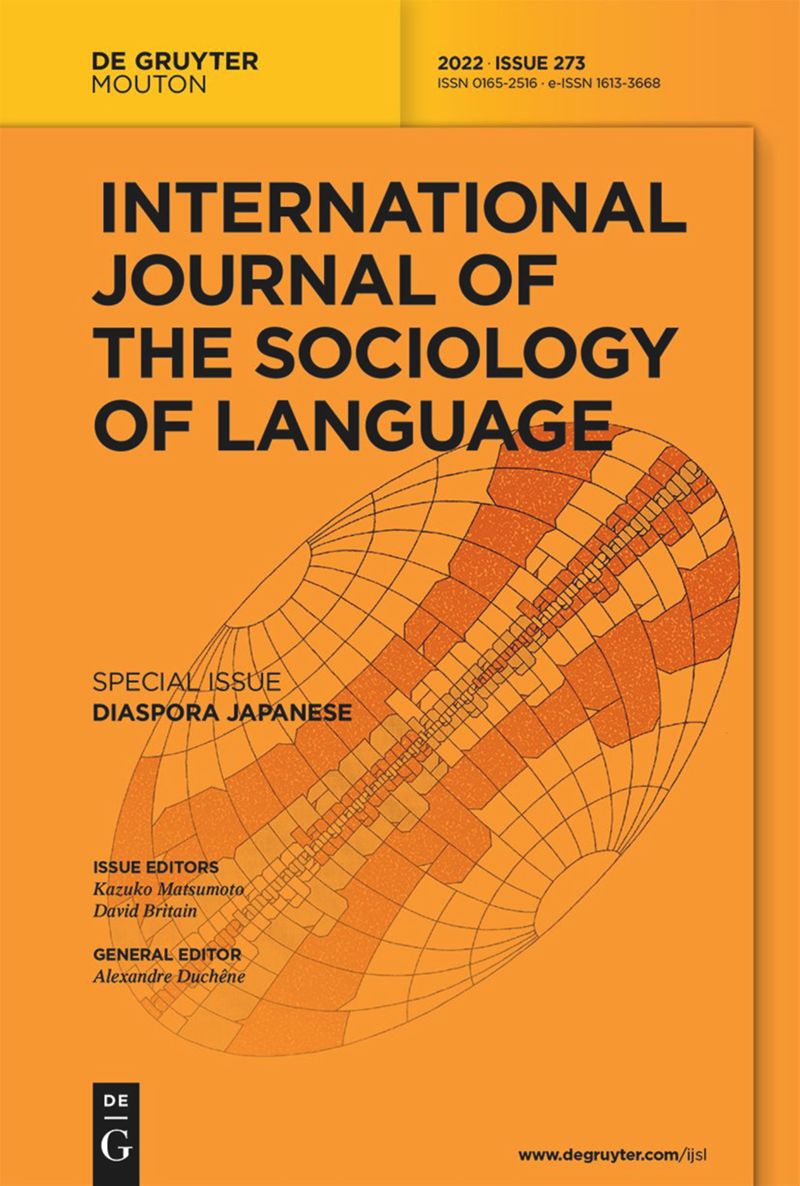
|
Identity Construction of Hong Kong Returnees: Stance Taking and Self-labelling in Narratives. International Journal of the Sociology of Language. DOI: 10.1515/ijsl-2021-0106.
Abstract:
This study examines how Hong Kong returnees negotiate and construct their transnational identities in their post-sojourn period via two indexical cues, stance taking, and self-labelling. Based on the narratives about remigration, this study investigates how returnees construct their identities discursively by taking stances to evaluate and align with sociocultural values and using self-labelling to index their transnational identities in their post-sojourn period. In doing so, this study hopes to contribute to the existing migration studies on Hong Kong returnees in terms of language and identity construction.
|
Poudel, P. P., Jackson, L.,
& Choi, T.-H.
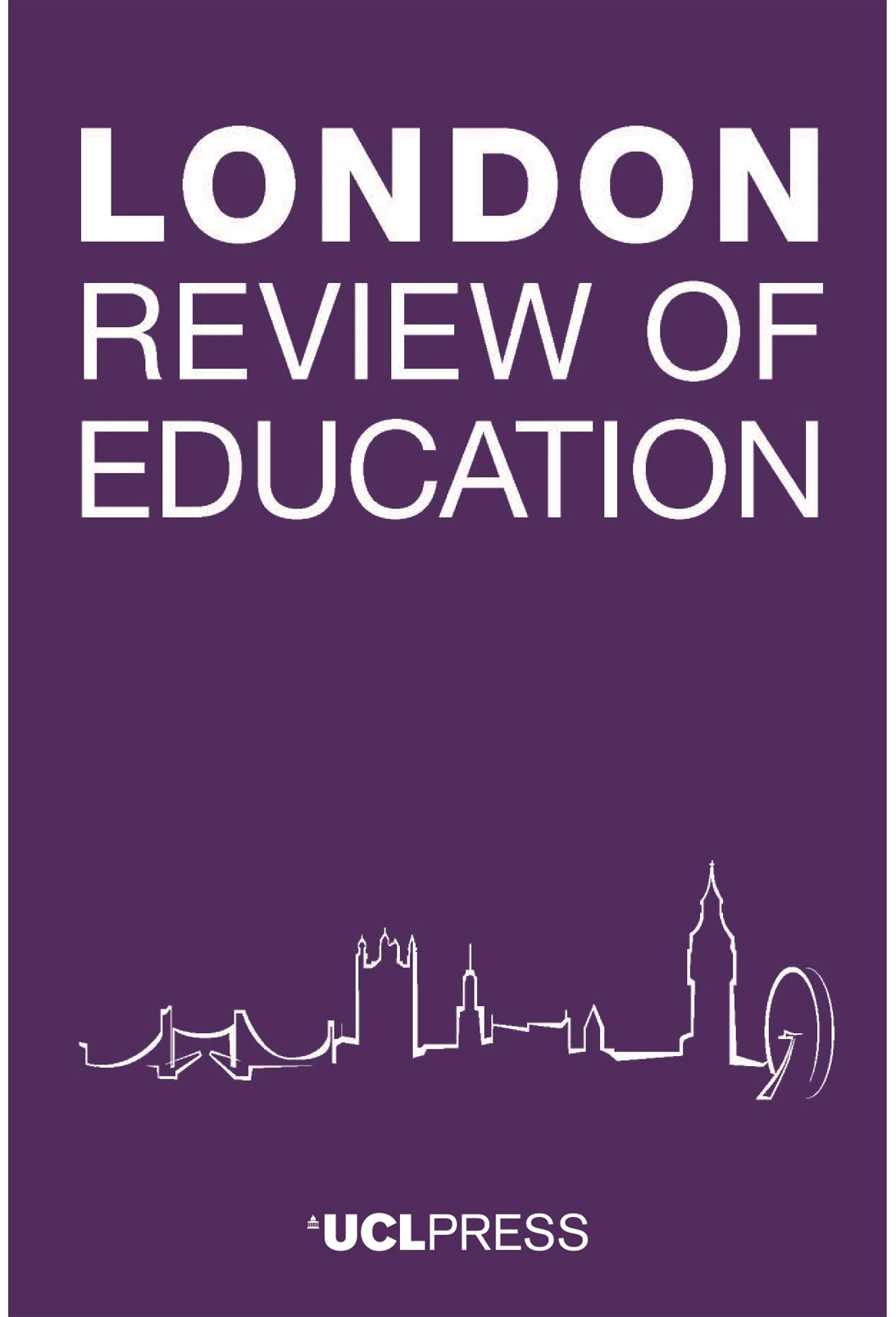
|
Decolonisation of curriculum: The case of language education policy in Nepal. London Review of Education, 20(1), 1-15 Doi:10.14324/LRE.20.1.13..
Abstract:
While decolonisation is usually discussed in relation to countries that were formally colonised, countries that have not been formally colonised have also faced challenges related to colonialism. In this case, it is worth considering whether decolonial theory has more widespread applicability to respond to global challenges faced in the postcolonial era. This article documents the historical trajectories of colonisation and decolonisation of the school curriculum in Nepal. Although Nepal was never formally colonised, the introduction of modern schooling in Nepal was informed by the British colonisation of India, where local languages were replaced by English in the curriculum, diminishing the value of local languages and knowledges. Against this backdrop, the Nepal government issued a series of policies supporting Nepali supremacy, but the expansion of English was not significantly challenged. Rather, the policies resulted in a double colonisation of ethnic/Indigenous languages: external colonisation by English, and internal colonisation by the Nepali language. However, significant decolonisation efforts have recently made space for minoritised languages in the curriculum. This article illustrates these colonisation and decolonisation waves, shaped by the government, local communities and other actors. Drawing on Nepal’s legislative and educational policies, the article relates language policy decisions and actions as decolonial efforts to support ethnic/Indigenous languages and explores the implications for understanding tensions around decolonisation of curriculum.
|
Chan, K. K. S.,
Lee, J. C. K.,
Yu, E. K. W.,
Chan, A. W. Y.,
Leung, A. N. M.,
Cheung, R. Y. M.,
Li, C. W.,
Kong, R. H. M.,
Chen, J.,
Wan, S. L. Y.
Tang, C. H. Y.,
Yum, Y. N.,
Jiang, D.,
Wang, L.,
& Tse, C. Y.
 |
The Impact of Compassion from Others and Self-compassion on Psychological Distress, Flourishing, and Meaning in Life Among University Students. Mindfulness. https://doi.org/10.1007/s12671-022-01891-x.
Abstract:
Objectives Research shows that compassion from others and from the self may enable university students to face, overcome, and bounce back from adversity and generate a greater sense of thriving and meaning in life. However, the underlying processes are largely unknown. The present study aimed to examine the associations of compassion with psychological distress, flourishing, and meaning in life among university students and explore the mechanisms underlying these associations.
Methods A total of 536 Hong Kong university students completed questionnaires measuring their experiences of compassion from others, self-compassion, resilience, psychological distress, flourishing, and meaning in life.
Results Serial mediation analyses showed that compassion from others was associated positively with self-compassion, which was, in turn, linked to greater resilience and consequently lower levels of psychological distress and higher levels of flourishing and meaning in life.
Conclusions Our findings reveal the associations of compassion from others and self-compassion with the well-being and life meaning of university students. The findings highlight the importance of being open and receptive to love and kindness from others. The findings also point to the importance of developing a caring attitude toward oneself.
|
Wang, X.,
Yan, Z.,
Huang, Y.,
Tang, A.,
& Chen, J.

|
Re-Developing the Adversity Response Profile for Chinese University Students. International Journal of Environmental Research and Public Health, 19(11), 6389. DOI:10.3390/ijerph19116389.
Abstract:
Adversity response is fundamental to dealing with adversity. This paper reports the re-development and subsequent psychometric evaluation of the Adversity Response Profile for Chinese University Students (ARP-CUS). The data were collected from a Chinese university student sample (n = 474). Factor analysis and Rasch analysis were used to examine the psychometric properties of the ARP-CUS. Exploratory factor analysis revealed a six-factor model; then confirmatory factor analysis supported a five-factor solution. Rasch analysis provided further evidence of the psychometric quality of the instrument in terms of dimensionality, rating scale effectiveness, and item fit statistics for those six dimensions. The final version of the ARP-CUS contains 24 items across five subscales for assessing students’ responses to adversity, including control, attribution, reach, endurance, and transcendence. Overall, ARP-CUS demonstrates satisfactory psychometric properties for quantifying the adversity quotient of Chinese university students
Keywords: Adversity Response Profile, Adversity Quotient, Scale Re-development, Rasch Measurementcipation
|
Tang, H. H. H.,
& Dang, B. Y. Y.

|
Warming up or cooling out? Educational desire and higher education participation in an Asian context. The Australian Educational Researcher. https://doi.org/10.1007/s13384-022-00528-1
Abstract:
Concerns of equity with respect to the community college model in East Asia persist in educational research. In this study, we described and analysed students’ “lived experience” in community colleges in Hong Kong in terms of the “warming up” or “cooling out” of their educational desire. Semistructured interviews with 14 graduates of community colleges in Hong Kong were conducted to determine how their experiences at community colleges afected their educational expectations and the extent to which community colleges help students reconsider their educational disadvantages in a competitive, meritocratic and massifed higher education system. The qualitative interview data were inductively thematised into four aspects of college experience in relation to their educational expectations. The data revealed that Hong Kong’s community colleges help some students develop their capabilities and change their educational expectations through democratic admissions, liberal pedagogic environments, learner-centred formative assessment and student services for strategic university articulation. Rather than cooling-out students’ educational desire (characterised by gradual disengagement, objective denial, alternative achievement), community colleges in Hong Kong provide a second chance for failing and disadvantaged students to pursue a university education, but this warming-up function applies only to students who beneftted from the liberal mode of assessment and discovered and developed their academic capabilities in their college experience. The paper ends with a critical analysis of the problem of such warming up of educational desire and the extent to which community colleges can empower disadvantaged students for a good life.
Keywords: Community College, Higher Education Massifcation, Hong Kong, East Asia, Educational Desire, Widening Participation
|
Lee, M. S.,
Kim, J. W.,
Mo, Y,
& Walker, A.

|
A review of professional learning community (PLC) Instruments. Journal of Educational Administration, 60(3), 262-287.
https://www.emerald.com/insight/content/doi/10.1108/JEA-03-2021-0060/full/html.
Abstract:
Purpose Despite the continuous growth of empirical studies exploring professional learning communities (PLCs) across different education systems, little is known about PLC instruments developed and used in existing research. This article aims to capture a full picture of existing PLC instruments developed since 1990. In so doing, the authors also pay attention to the seminal work of Karen Seashore Louis in alignment with the theme of the special issue.
Design/methodology/approach Based on the authors’ searching databases, the authors identified eleven PLC instruments and 26 applied studies using the PLC instruments since 1990. Following this, the authors closely reviewed the identified studies and their relationships (i.e. which one influences which).
Findings The authors’ review illuminates the measurement domains, conceptual origins and methodological soundness of the existing instruments and captures the impact of Louis's work on the applied studies using PLC instruments.
Originality/value Given that PLCs are seen as a policy measure to sustain and scale up school improvement internationally, the authors’ review provides a better understanding of what and how researchers have measured the effect of PLCs on school improvement. As the first of its kind, the authors believe that their findings can give researchers valuable ideas about how to develop and use a PLC instrument.
Keywords: Professional Learning Community (PLC); Instruments; Conceptual Origins; Measurement Domains; Methodological Soundness; Validation; Karen Seashore Louis
|
Arar, K.,
Örücü, D.,
& Gümüş, S.

|
Educational Leadership and Policy Studies in Refugee Education: A Systematic Review of Existing Research. Educational Review, DOI: 10.1080/00131911.2022.2066632.
Abstract:
Given the growing concerns regarding the education of the rapidly increasing refugee children population around the world and the scholarly attention towards refugee education contexts in educational leadership and policy fields in recent years, we were urged to locate and understand the research contribution to the relevant knowledge base. This study, therefore, aims to systematically review the existing educational leadership and policy literature in relation to K-12 education of refugee children to demonstrate the overall trends of the related studies in terms of context (year, country, school level, and journal outlets), type of study, methodology, and topical focus. We conducted a systematic review of literature by following the steps identified by PRISMA (Preferred Reporting Items for Systematic Reviews and Meta-Analyses), including the processes regarding data sources, search, data collection, eligibility criteria, data selection, and data analysis. Overall, the results of our review suggest that educational policies addressing the refugee children and educational contexts shape the implementations of educational leaders and consequently the refugee students' opportunities in schools. The results and implications for future research are discussed in more detail based on the results of the review.
|
Gümüş, S.,
Bellibaş, M. S.,
& Pietsch, M. A.

|
School leadership and achievement gaps based on socioeconomic status: A search for socially just instructional leadership.
Journal of Educational Administration, Vol. ahead-of-print No. ahead-of-print. https://doi.org/10.1108/JEA-11-2021-0213.
Abstract:
Purpose The research literature in this field demonstrates that instructional leadership provided by principals is essential for student learning, but the question of its impact on students with high and low socioeconomic status (SES) has remained largely unexplored. In the present study, the authors focus on the moderating role of instructional leadership in the relationship between SES and achievement at both the school and student levels.
Design/methodology/approach Using cross-national Programme for International Student Assessment (PISA) 2015 data, the authors fitted multilevel models to investigate whether the effect of instructional leadership on student achievement in math, science and reading varies across groups of students with the different individual as well as school SES levels.
Findings Instructional leadership significantly moderates the relationship between school-level SES and student achievement in math, while the moderation effect for individual SES and instructional leadership is not significant for any subject.
Research limitations/implications This study calls for more research on the moderation role of leadership in the relationship between SES and student achievement, with a specific focus on the integrated models that include the social justice aspect of school leadership.
Originality/value The authors conclude that while instructional leadership might be beneficial in reducing the achievement gaps between schools, it may not make much difference in terms of reducing the disparity between different SES groups within schools.
Keywords: Moderating Effect, Socioeconomic Status, Instructional Leadership, Student Achievement, Achievement Gaps.
|
Qian, H., &
Walker, A.
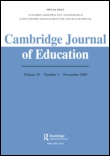
|
Becoming a teacher leader: Capital acquisition and accumulation. Cambridge Journal of Education. DOI: 10.1080/0305764X.2022.2047891.
Abstract:
As an acknowledged example of a carefully structured teacher learning system, Shanghai has a long tradition of using expert teachers to drive teacher learning both within and across schools. This article tracks the work voyages of eight expert teachers in Shanghai using three forms of capital. The purpose of the paper is to explore how these teachers obtained and accumulated their human, social and symbolic capital from when they entered the profession as novice teachers to their present standing as influential expert teachers. The article identifies the significant people and critical events that facilitated capital accumulation throughout their professional voyages. Conditions conducive for teacher leaders to emerge and exert leadership are unravelled and delineated. These conditions include a centralised and policy-driven structure and the dominant societal culture with high regard for education and seniority. More research is needed to know if the study’s findings hold currency across different contexts.
Keywords: China, Expert Teachers, Capital, Teacher Leaders, Cross-school.
|
Bryant, D. A.,
& Walker, A.

|
Principal-designed structures that enhance middle leaders' professional learning. Educational Management Administration & Leadership. https://doi.org/10.1177/17411432221084154.
Abstract:
Middle leaders in schools are increasingly recognised as playing pivotal roles in school improvement. Although some school systems provide formal professional development for middle leaders, many middle leaders express a preference for job-embedded learning. Yet, international research has documented difficulties in providing intensive support from principals which instead is often ad hoc. This study examines how middle leaders’ professional learning can be supported through the development of appropriate organisational structures. It presents three principal-designed models distilled from qualitative data collected in 12 case study schools, inclusive of public, semi-private, and international schools in four East Asian societies. Each model contributed to the development of middle leadership capacity in areas relevant to the schools’ improvement agendas. The models vary in degrees of formality, resource intensiveness, and processes for engaging and developing leadership. The findings contribute to the growing literature on middle leader development, and the role of school infrastructure in professional learning by suggesting how school-based leader development strategies can be framed in coherent and intentional models that take into account of the available infrastructure and potential professional interactions to provide systematic in situ support for middle leaders.
Keywords: Middle Leaders, School Infrastructure, Professional Learning, Leader Development
|
Mulvey, B.,
& Wright, E.
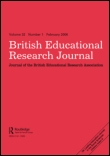
|
Global and local possible selves: Differentiated strategies for positional competition among Chinese university students. British Educational Research Journal. https://doi.org/10.1002/berj.3797.
Abstract:
The term neijuan (in English ‘involution’) has captured feelings of perpetual competition and anxiety among university students in China preparing for their post-graduation careers. In this article, we develop a neo-Weberian reading of neijuan to construct a framework using positional conflict theory and the concept of ‘possible selves’. We investigated how final-year university students from three social class factions—rural, urban non-elite and urban elite—envisage, plan and strategise for their future careers. We draw on in-depth interviews (n = 100) and a post-graduation survey (n = 97) with students at two public universities, one elite and one lower-tier, in a metropolitan city in Guangdong province. The findings underscore marked differences in the nature and clarity of students’ envisaged future selves along the lines of social advantage and disadvantage. We demonstrate how social class is deeply connected to the scale of the competition—national or global—that students perceive themselves to be implicated in. In doing so, we draw attention to social class differences in expressions of and capacities to realise what we term ‘globally orientated possible selves’, which involved escaping both the sense of entrapment and the prospect of failure evinced by neijuan.
|
Yemini, M.,
Lee, M. S.,
& Wright, E.

|
Straddling the global and national: the emerging roles of international schooling, Educational Review, 74:1, 1-5, DOI:10.1080/00131911.2022.2030959.
Abstract:
Reflecting the growing spotlight on international schooling over the last three decades, this special issue aims to illuminate how education is straddling complex tensions between global and national forces across various contexts. Taking a comparative perspective, the special issue addresses the following key questions: How does the growing provision of and desire for international programmes affect education not only in international schools but also in other types of schools in their local/regional/national/international arenas?; How are schools across diverse contexts engaging with what international programmes represent as a global education for a global future?; How might a focus on “the global” facilitate or undermine engagement with local and national citizenship?; How have public schools and local governments responded to the expansion of international programmes into national education systems?; How are the educational opportunities and experiences of marginalised communities influenced? Eight research articles and a commentary in the special issue deepen our understanding of the changing nature of international schooling and its influence on national education systems.
Keywords: International Schooling; International Baccalaureate Programmes; National Education Systems
|
Lee, M. S.,
Kim, H.,
& Wright, E.

|
The influx of International Baccalaureate (IB) programmes into local education systems in Hong Kong, Singapore, and South Korea, Educational Review,
74:1, 131-150, DOI: 10.1080/00131911.2021.1891023.
Abstract:
This comparative analysis aims to capture the complex roles and positionings of the International Baccalaureate (IB) in conjunction with local education systems in Hong Kong, Singapore, and South Korea. Our analysis focused on how the IB’s institutional legitimacy is presented in the three societies. We conducted a documentary analysis of texts on the introduction and implementation of IB programmes into local school systems. Our findings suggest that there are commonalities and variations in how the IB is interpreted by key local agents and is positioned into local education systems. Specifically, across the three societies, the IB has expanded continuously. At the same time, its institutionalisation process varies by each society’s socio-historical context and needs: substantive legitimacy as the international curriculum of choice in Hong Kong, a quiet supplement to elite education in Singapore, and instrumental curriculum borrowing for fixing the education system in Korea. We also find that the institutionalisation of the IB is limited at a symbolic level and controlled by the Singaporean government, while the IB is saliently promoted by local education authorities in the context of education reform in Korea. The institutionalisation process of the IB in Hong Kong is primarily swayed by market principles under the existing school choice system. |
Wright, E.,
Feng, S.,
& Zheng, Y.
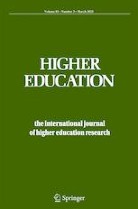
|
Unemployed graduate to the next Jack Ma? A counter-narrative to the entrepreneurship movement in higher education. Higher Education The International Journal of Higher Education Research, 83, 863-880. https://doi.org/10.1007/s10734-021-00709-4.
Abstract:
An entrepreneurship movement has advanced into higher education. There is a growing expectation that universities demonstrate an economic contribution to the public good by instilling students with entrepreneurialism and providing guidance for starting businesses. In China, the state has launched a ‘Mass Entrepreneurship and Innovation’ initiative as part of a national development strategy, which required universities to increase resources for entrepreneurial activities and for all students to complete an entrepreneurship education course. This article applies new institutionalism theory to illuminate how the mass entrepreneurship initiative filtered down to universities and students. Data were analysed from policy documents and interviews (n = 100) with final-year undergraduates in the social sciences and humanities at two public universities in Guangdong Province. The universities were found to conform ceremonially to the institutionally legitimated initiative, but entrepreneurship provisions for undergraduates remained limited. At the same time, mass entrepreneurship was found to be disconnected from student experiences. One group (the ‘avoiders’) perceived entrepreneurship as unfeasible or a remote possibility in their lives. A second group (the ‘venturers’) were unprepared for starting a business and described hardships resulting from their failures. The findings provide a counter-narrative to the entrepreneurship movement and raise ethical questions about the mass promotion of entrepreneurship to students without due consideration to the risks.
|
Bautista, A.,
Ho, Y. L.,
Fan, T.,
Yeung, J.,
& Bryant, D. A.
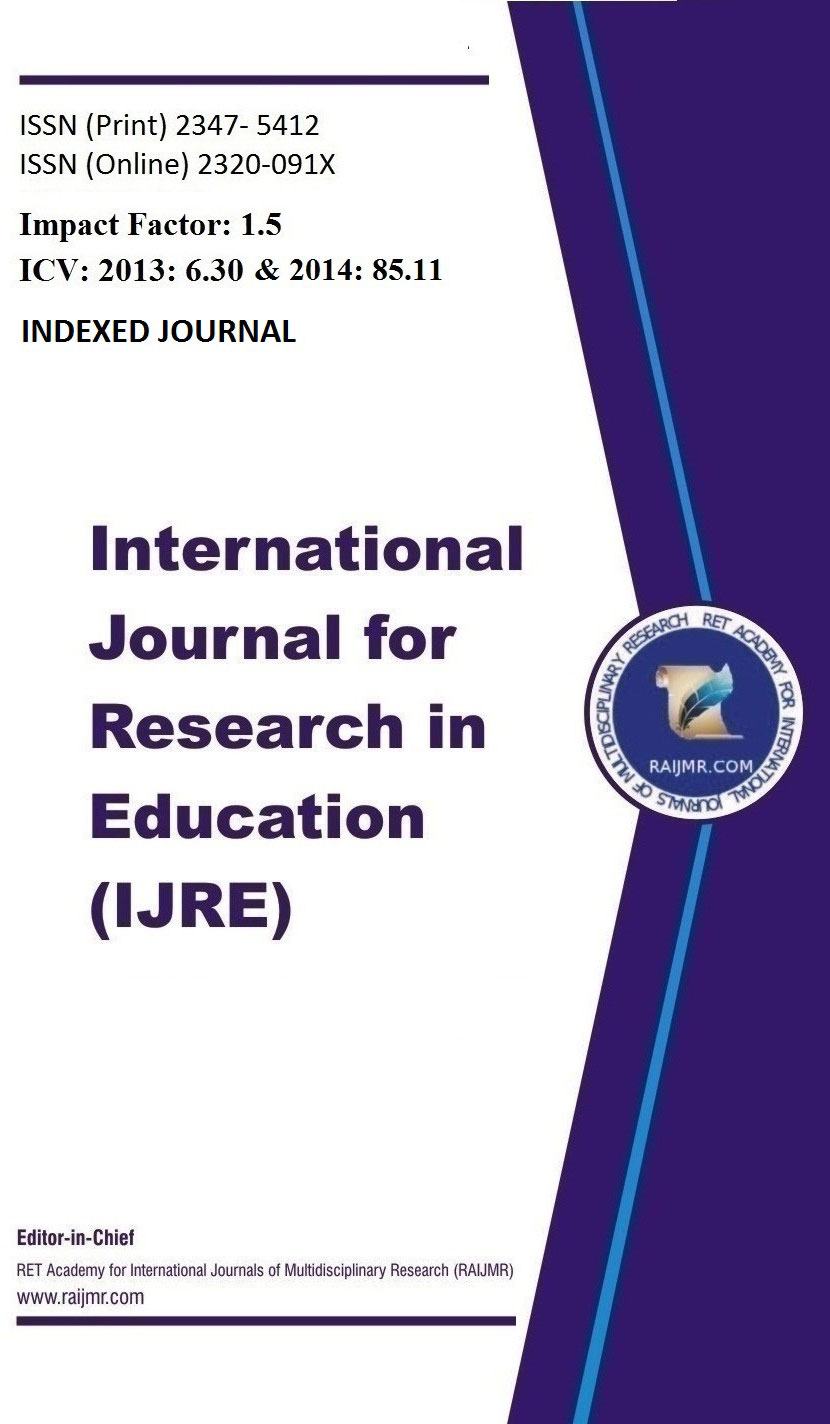
|
Teacher Professional Development in Hong Kong: Describing the current infrastructure. International Journal for Research in Education, 46(2), 202-260.
Abstract:
This article describes the current teacher professional development (PD) infrastructure of Hong Kong, one of the world’s top performers in education. Drawing on contemporary policy frameworks, institutional websites, and research literature, we outline how teachers from primary and secondary local schools are supported to enhance their professional capacity. After introducing the structure of the Hong Kong education system, we describe pre-service teacher education and the Professional Ladder framework, designed by the Education Bureau (EDB) to regulate in-service PD. We then describe the work done by the leading PD providers and the PD-related obstacles, difficulties, and constraints reported in the literature. The article shows that Hong Kong has developed a solid PD infrastructure with hybrid characteristics. While the system is based on compliance and external accountability mechanisms, teachers are encouraged to design their PD journeys based on their interests, needs, and career aspirations. Every three years, teachers are required to complete 90 to 150 hours of PD (depending on seniority), including core and elective training (approximately 1/3 and 2/3 of the PD allotment, respectively). Structured, on-the-job, project-based, whole-school, and individual PD activities are available. The article also describes the strategies recently adopted to tackle the challenges of COVID-19. We conclude that Hong Kong has made great efforts to design a high-quality PD infrastructure within a hierarchical educational system, in which quantity of provision and content coverage have been prioritized over teacher agency and autonomy. More research is required to investigate the actual impact of PD on teachers’ practices and students’ learning.
|
Ling, X.,
Chen, J.,
Chow, D. H. K.,
Xu, W.,
& Li, Y.
 |
The “trade-off” of student well-being and academic achievement: A perspective of multidimensional student well-being.
Frontiers in Psychology (Educational Psychology). https://doi.org/10.3389/fpsyg.2022.772653.
Abstract:
Student well-being and its relationships with academic achievement in China have not been well-investigated. This study aimed at investigating student well-being and the trade-off of the well-being and academic achievement with a sample of 1,353 Chinese high-school students from four cities in China during coronavirus disease 2019 (COVID-19) pandemic period. The six dimensions of well-being (academic, psychological, self, physical, social, and spiritual) were utilised to test the relationships with three subjects including Mathematics, English, and Chinese using a quantitative analysis. In this study, the relationships between six dimensions of well-being and three academic subject achievements were tested in one statistical model. Results showed that spiritual well-being was ranked the highest, followed by psychological, physical, self, and social well-being. Students gave the lowest ranking to academic well-being. The two significant paths identified were between spiritual well-being and two subjects, namely, Chinese and Mathematics. It is interesting to note that the other five dimensions of well-being were significantly associated with any subjects and English was not significantly related to any dimensions of well-being in this study. Our findings suggested that policymakers and other stakeholders should avoid an “all or nothing” mindset on practice when considering well-being as a multidimensional construct.
|
Creagh, S.,
Hogan, A., Lingard, B.,
& Choi, T.-H.
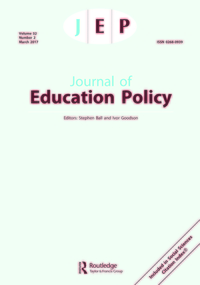 |
The ‘everywhere and nowhere’ English language policy in Queensland government schools: A license for commercialisation.
Journal of Education Policy. Advance online publication. https://doi.org/10.1080/02680939.2022.2037721.
Abstract:
The paper explores the policy logics of privatisation through service provision for students with English as an Additional language or dialect (EAL/D) in the state education system of Queensland, Australia. In the context of EAL/D, specifically targeted policy has been subsumed by a broader umbrella or meta-policy of inclusion, whilst at the same time, funding support for EAL/D learners is substantial. The devolution of EAL/D support to individual schools through autonomous targeted funding results in policy ‘everywhere’, distributed across broad portfolios dedicated to ensuring schools provide quality education services for all learners, but also ‘nowhere’, lacking systemic support and detail on how inclusion should be enacted for EAL/D and with no accountability placed on schools to demonstrate that they are addressing EAL/D learner needs. The co-location of EAL/D policy with a broad systemic policy of inclusion, the absence of systemic professional support, combined with devolution to school sites has had real effects on the policy in practice. The analysis demonstrates there is the potential opening of EAL/D provision to market forces at school sites, where the private sector can potentially sell commercial ‘solutions’ directly to schools, which have greater autonomy over one-line budgets.
Keywords: English as an Additional Language (EAL); Structural Reform; Privatisation; Commericalisation; Policy Enactment; Inclusion
|
Tang, H.H.H.
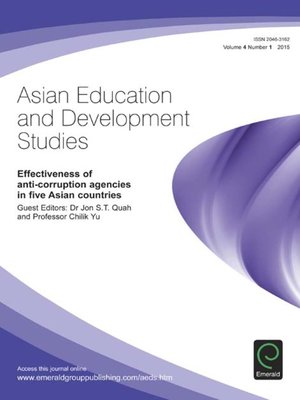
|
The Strategic Role of World Class Universities and Academic Profession in Regional Innovation System: The Case of China’s Greater Bay Area. Asian Education and Development Studies 11(1), 7-22.
Abstract:
Purpose This paper aims to examine the strategic role of world-class universities and the international academic profession in the regionalisation project of China’s Greater Bay Area (GBA). It illustrates the way in which the case of the GBA regionalisation project offers a potentially rich empirical example for adding contextual understanding to the literature of the Triple Helix model, which largely draws on inductive theorising from western successful innovation cases. The GBA regionalisation processes will provide a wealth of empirical cases for identifying circumstances that address tensions and increase interactions in the Triple Helix relationship of university, government and industry for fostering knowledge synergies. Design/methodology/approach Focusing on the case of Hong Kong, it engages in policy and stakeholder analysis and addresses three key research questions: What are the competitive advantages and potential strategic role of Hong Kong's universities and academic profession in the regionalisation of innovation systems in the GBA? What is the role of the governments in the regionalisation processes? What are the expected opportunities and challenges offered by the GBA policy initiatives for the future development of Hong Kong’s universities and academic profession?
Findings Hong Kong, given its status as an international finance centre and global city with intense internationalisation and established judicial system operated by the rule of law, will contribute to the GBA development by leveraging on its edge in scientific research and development and international networks of academic research through the world-class academic profession. Scientists and researchers in the city, possessing the competitive advantages of basic research and international partnerships, are highly regarded by the central government. The engagement of Hong Kong’s scientific talents, can play an important role in achieving China’s aspiration of becoming a global technology power.
Research limitations/implications Analysis of this article implies that the GBA concept is currently China’s ambitious but vague economic plan. The opportunities in which key node cities and knowledge/ innovation clusters will capture and capitalise from the regional ‘co-opetitive” ’entrepreneurial ecosystem are still unclear. The future of the GBA regionalisation is so dynamic and open-ended that grounded concepts related to the governance innovation/ discourse of ‘one country two systems’ and social connectedness and capitalisation with Chinese characteristics will help in making sense of the contextualisation of a Chinese regional innovation system and enhancing the sophistication of reconceptualisation of the Triple Helix model.
Originality/value This article will add to the literature some novel contextualised knowledge about the GBA’s potential triple-helix relationship between government-university-industry in the 21st century. The empirical example of China’s GBA will also shed light on a new understanding of the role of international social capital in the entrepreneurial knowledge economy, dynamics between basic and applied research, and a synergistic interface between regionalisation and national innovation system.
Keywords: Hong Kong; Triple Helix; Academic Profession; China's Great Bay Area; Regional Innovation System; World-class Universities
|
Nichols, N.,
& Tang, H.H.H.
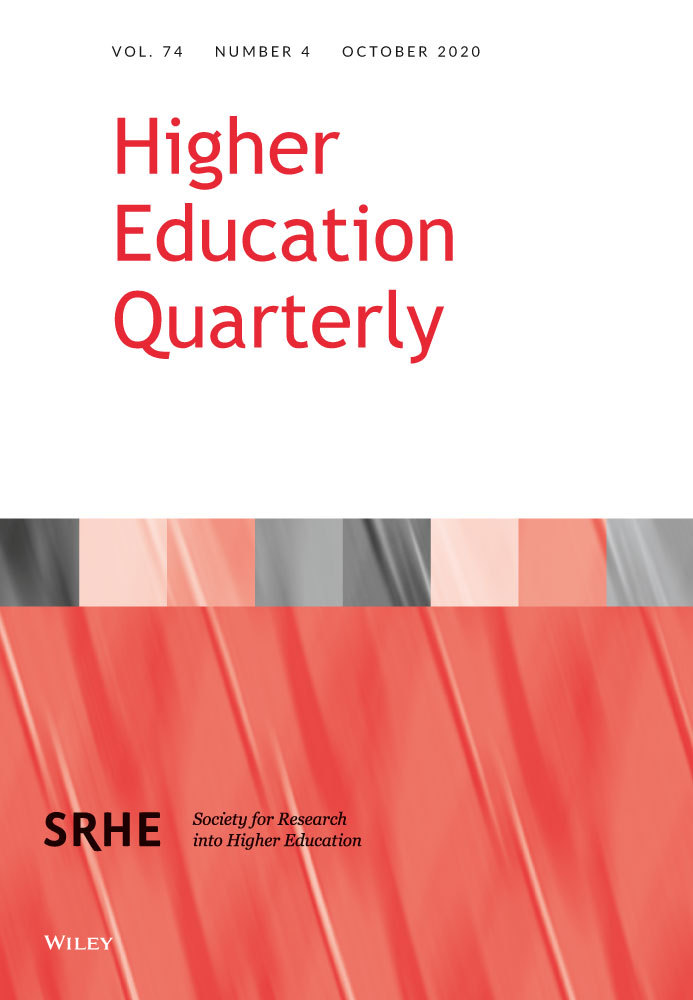
|
Navigating Managerial and Entrepreneurial Reforms in Research Intensive Universities: A Comparison of Early Career Trajectories in Hong Kong and Canada. Higher Education Quarterly 76(1), 76-130.
Abstract:
This article conveys the results of a reflexive investigation of the managerial practices and entrepreneurial discourses that shape the academic trajectories of early career scholars. Beginning with the experiences of early career scholars in research-intensive universities in Canada and Hong Kong, the authors explore some of the social and political-economic relations that are reshaping higher education systems across the world. Drawing on experiences navigating university governance, funding and performance management processes, the authors explore how participation in the marketised relations of higher education inserts people into competition with colleagues within and beyond a single university context, instrumentalises and constrains relationships with civil sector collaborators, and produces a shared sense that nothing one does is ever enough. In this way, the article illuminates some of the ways a new global knowledge economy conditions academic life. |
So, W. W. M.,
He, Q.,
Chen, Y.,
Li, W. C.,
Cheng, I. N. Y.,
& Lee, T. T. H.
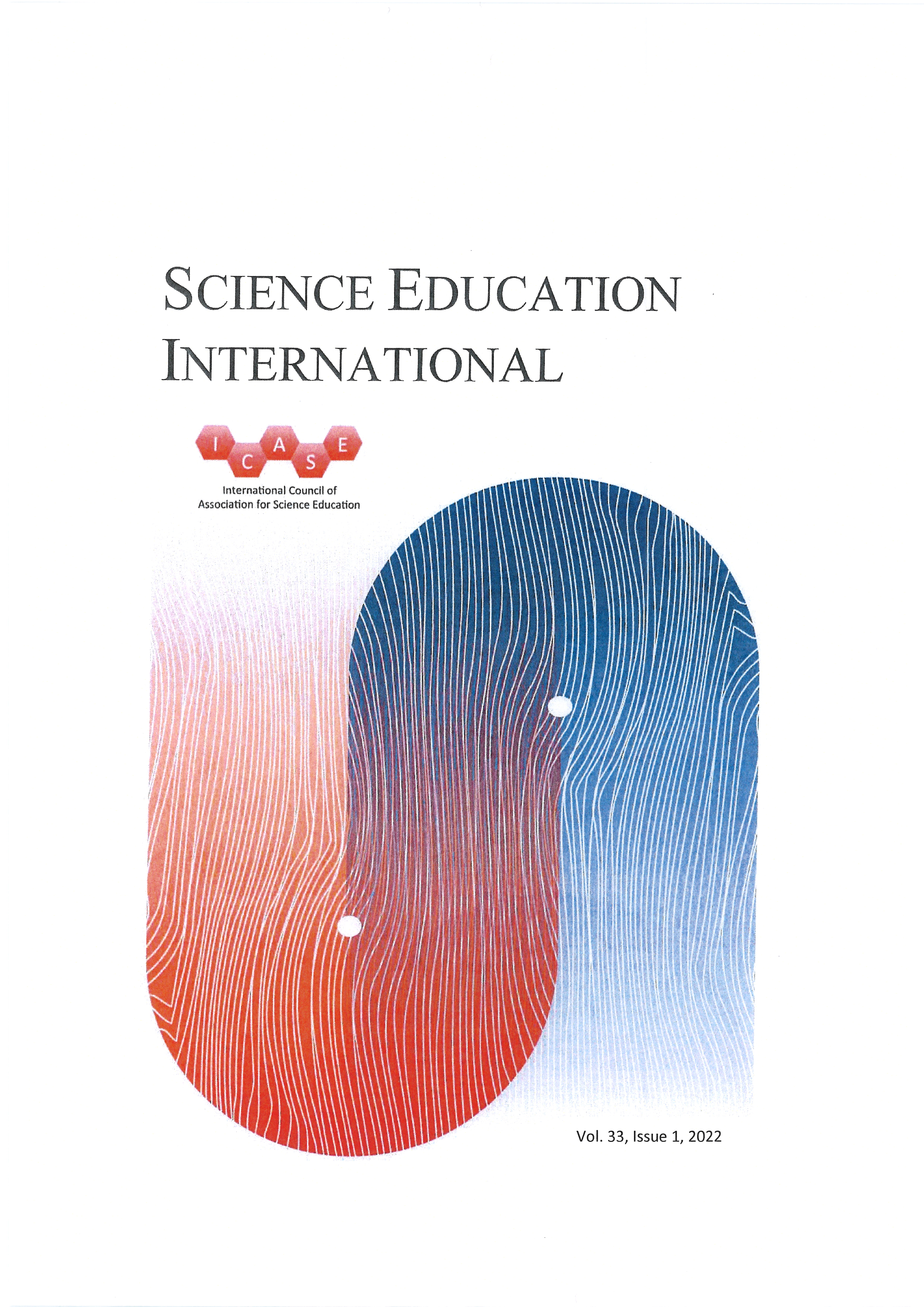
|
Engaging students with intellectual disability in science, technology, engineering, and mathematics Learning. Science Education International, 33(1), 25-37.
Abstract:
Recent studies show that many of the current and future careers involve some form of science, technology, engineering, and mathematics (STEM) integration. The new development of school STEM education provides opportunities for students to acquire the necessary knowledge, skills, and attitudes to face the challenges ahead. Involving students with different disabilities in STEM learning is of particular importance and usefulness because we should not deprive them of opportunities to engage in STEM fields in the future. However, how to expose students with intellectual disabilities (ID) to STEM learning have not been well explored. STEM learning can mean something different to each teacher, and how they integrate it into their classrooms may also differ. There are suggestions to use inquiry, engineering, and technology to support students with special needs. In the design of STEM learning for students who have ID, teachers from a special school constructed a 4E model of engaging, exploring, engineering, and explaining, which emphasizes inquiry and at the same time leverages technology and engineering to integrate learning content into a purposeful and informed way to improve student engagement in lessons. Lesson observations were conducted to study students’ cognitive, affective, and behavioral engagement in lessons. Results showed that students with mild ID in the classes responded and worked actively, while those with moderate ID asked for more assistance. Moreover, it was found that students were less involved in explaining. This research provides a practical model and evidence of student engagement in STEM learning. |
Nikkola, T.,
Kangas, J.,
Fong, K. M. Y.,
& Reunamo, J.
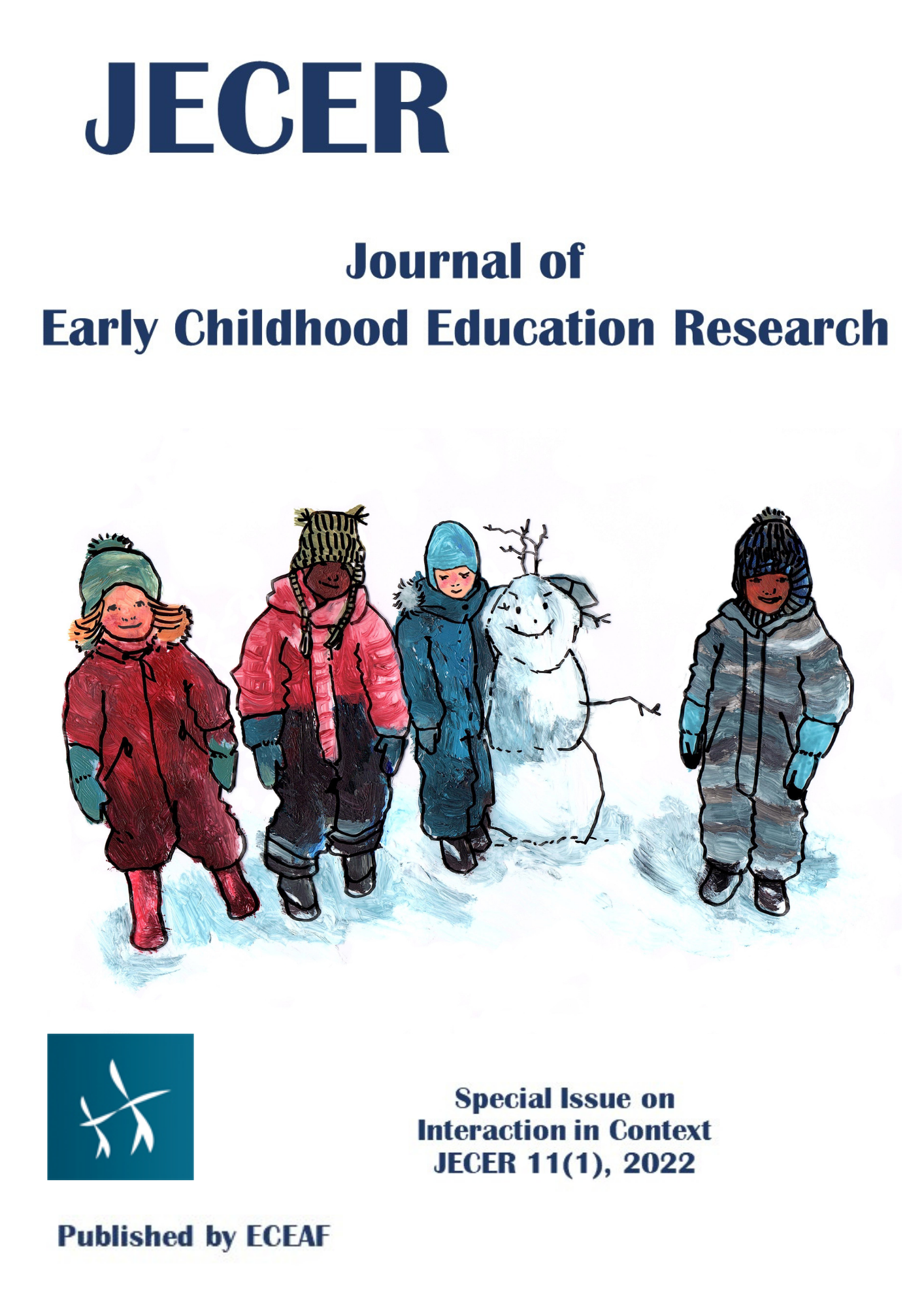
|
Children’s social orientations as creative processes in early childhood education and care. Journal of Early Childhood Education Research, 11(1), https://journal.fi/jecer/article/view/114020.
Abstract:
The purpose of this article is to study children’s social orientations as creative processes in early childhood education and care (ECEC). In this article, we focus on how children’s creative thinking abilities relate to children’s social orientations in interactive situations in ECEC. We study children’s creative thinking abilities with the Thinking Creatively in Action and Movement [TCAM] -test and children’s social orientations with the Child observation instrument of Reunamo (2007). Two hundred and eighty children in 23 ECEC institutions participated in the research. There were altogether eight randomly selected days for the observation between January and May 2015. The TCAM-test was conducted by teachers for their own group. The connections between the TCAM-test and the Child observation instrument were studied with partial correlations controlling children’s age. The results showed that children’s creative thinking abilities were associated positively with participative social orientation. An adaptive and withdrawn orientation had negative correlations with creative thinking abilities.
|
Zhao, Z,.
K
ennedy, K.,
& Wang X.
(accepted)
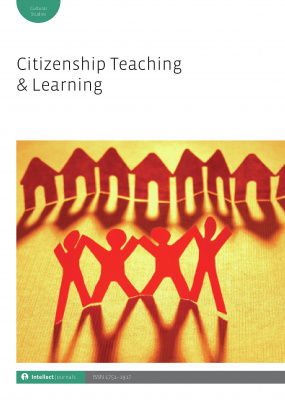
|
Teaching national identity in post-handover Hong Kong: Pedagogical discourse and recontextualization in the curriculum. Citizenship Teaching & Learning.
|
Tang, J.
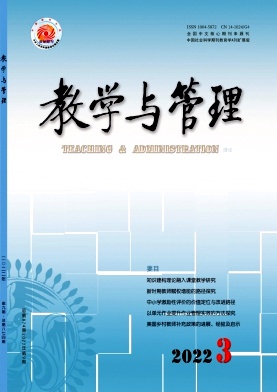
|
Difficulties and improvement pathways of teacher teaching and learning research. Teaching, Learning and Management, 2, 24-27. [Chinese Journal Article]
|
Tang, J.,
& Tang, Z.
|
Teaching and research in the basic education: Mechanisms and future directions. Contemporary Education Sciences, 8, 71-79. [Chinese Journal Article]
|
| |